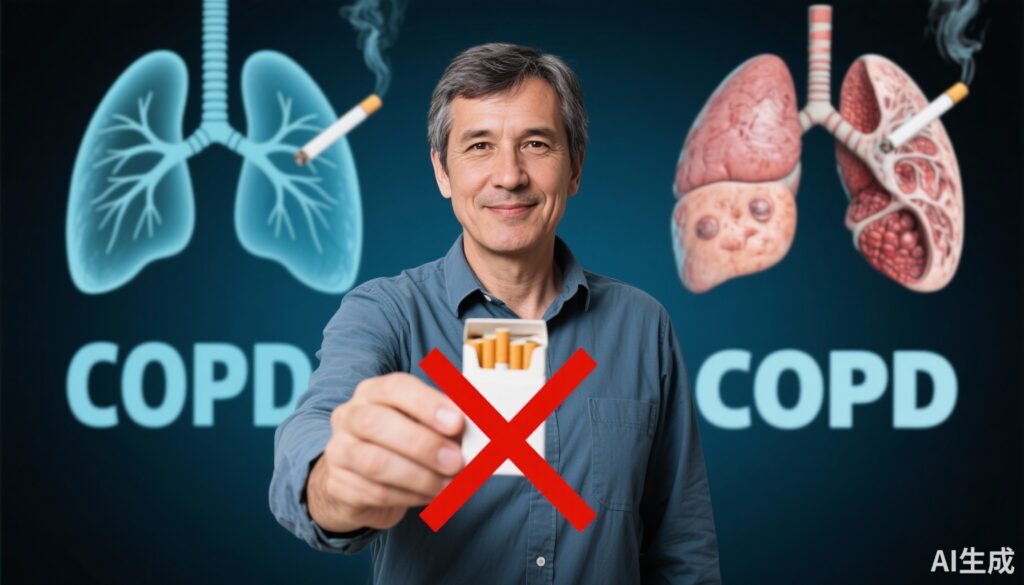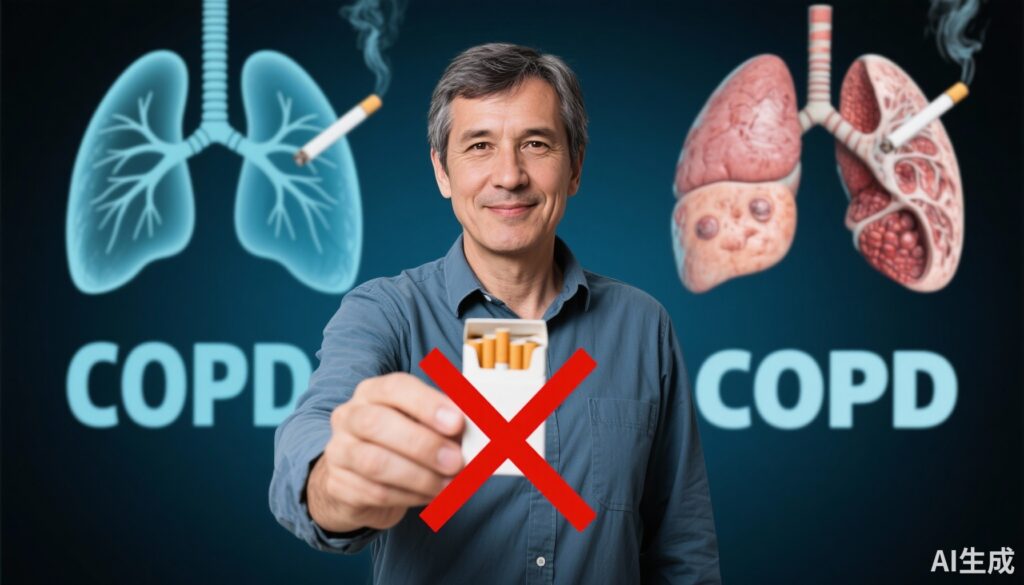Highlight
- Cytisinicline significantly increased continuous smoking abstinence in smokers with self-reported COPD compared to placebo.
- Both 6-week and 12-week treatment durations were effective, with no significant difference in efficacy between COPD and non-COPD smokers.
- The drug was well tolerated with no serious treatment-related adverse events, demonstrating a favorable safety profile.
- The findings support cytisinicline as a viable and effective pharmacotherapy for smoking cessation in the COPD population, a group at elevated risk due to nicotine dependence and chronic respiratory disease.
Study Background and Disease Burden
Chronic obstructive pulmonary disease (COPD) is a progressive respiratory condition characterized by airflow limitation and persistent respiratory symptoms. Smoking is the principal risk factor for COPD development and progression, and smoking cessation remains the most effective intervention to slow decline in lung function and reduce morbidity and mortality in this patient population. However, many smokers with COPD have high levels of nicotine dependence and face challenges in quitting.
Pharmacotherapies for smoking cessation include nicotine replacement therapy, bupropion, and varenicline, but these are not always effective or well-tolerated in individuals with COPD. Cytisinicline, a partial agonist of nicotinic acetylcholine receptors, is emerging as a promising agent with a mechanism similar to varenicline but potentially improved tolerability and cost-effectiveness. This post hoc analysis aims to evaluate cytisinicline’s efficacy and safety specifically in smokers with self-reported COPD, leveraging data from two phase 3 pivotal trials (ORCA-2 and ORCA-3).
Study Design
This analysis pooled data from two randomized, double-blind, placebo-controlled phase 3 trials: ORCA-2 and ORCA-3. A total of 1602 adult smokers were included, of whom 145 (9.3%) self-reported a COPD diagnosis.
Participants were randomized to receive either cytisinicline (3 mg three times daily) or placebo, combined with behavioral counseling support. Treatment durations were 6 weeks (n=532 cytisinicline) or 12 weeks (n=534 cytisinicline and n=536 placebo). The primary endpoint was biochemically verified continuous abstinence during the last 4 weeks of treatment, ensuring objective confirmation of smoking cessation.
Key Findings
Analysis found that individuals with COPD were older, had smoked for a longer duration, and exhibited higher nicotine dependence scores compared with non-COPD participants.
Cytisinicline significantly increased smoking cessation rates compared to placebo in both COPD and non-COPD groups, with no statistically significant heterogeneity in treatment effect between groups.
– In the 6-week treatment arm:
– COPD subgroup: 17.3% quit rate with cytisinicline versus 2.1% with placebo (OR 9.7; p=0.03).
– Non-COPD subgroup: 19.3% quit rate with cytisinicline versus 5.5% with placebo (OR 4.1; p<0.0001).
– In the 12-week treatment arm:
– COPD subgroup: 19.1% quit rate with cytisinicline versus 4.3% with placebo (OR 5.3; p=0.04).
– Non-COPD subgroup: 32.6% quit rate with cytisinicline versus 8.6% with placebo (OR 5.2; p<0.0001).
These results indicate robust efficacy of cytisinicline across both treatment durations and patient populations.
Safety analysis revealed that cytisinicline was well tolerated with no serious treatment-related adverse events reported in either COPD or non-COPD cohorts. Mild side effects were generally consistent with nicotinic receptor partial agonism, and dropout rates were comparable between treatment groups.
Expert Commentary
The findings from this post hoc analysis underscore cytisinicline’s potential as an effective smoking cessation aid in smokers with COPD, a group notoriously difficult to treat due to heavier nicotine dependence and comorbidities. The consistent efficacy across different treatment durations and patient subgroups strengthens confidence in cytisinicline’s clinical utility.
Current guidelines emphasize the critical importance of smoking cessation in COPD management to slow disease progression and improve prognosis. Pharmacological agents with demonstrated safety and efficacy are essential components of comprehensive cessation programs, particularly when combined with behavioral support.
Compared to existing pharmacotherapies like varenicline and bupropion, cytisinicline may offer a favorable tolerability profile and affordability, enhancing patient adherence and accessibility. However, the analysis is limited by reliance on self-reported COPD diagnosis without spirometric confirmation and a relatively small COPD subgroup. Further studies with objective COPD diagnosis and longer follow-up to assess sustained abstinence and respiratory outcomes will be valuable.
Conclusion
This post hoc analysis of the ORCA-2 and ORCA-3 phase 3 trials demonstrates that cytisinicline significantly increases smoking cessation rates among smokers with self-reported COPD, with efficacy comparable to that in non-COPD smokers. The drug is well tolerated and safe, supporting its role as a viable and effective therapeutic option for smoking cessation in this high-risk population.
Given the central importance of quitting smoking in the management and prognosis of COPD, cytisinicline represents a meaningful advancement in treatment options. Clinicians should consider incorporating cytisinicline alongside behavioral interventions to optimize cessation outcomes for patients with COPD.
References
1. Prochaska J, Rubinstein M, Perdok R, Blumenstein B, Jacobs C. Cytisinicline for smoking cessation in individuals with self-reported COPD: a post hoc analysis of the ORCA-2 and ORCA-3 trials. Thorax. 2025 Sep 17:thorax-2025-223880. doi: 10.1136/thorax-2025-223880. Epub ahead of print. PMID: 40962497.
2. Global Initiative for Chronic Obstructive Lung Disease (GOLD). Global Strategy for the Diagnosis, Management, and Prevention of COPD – 2024 Report. Available from: https://goldcopd.org
3. Fiore MC, Jaén CR, Baker TB, et al. Treating Tobacco Use and Dependence: 2008 Update. U.S. Public Health Service Clinical Practice Guideline. Respir Care. 2008;53(9):1217-1222.
4. Cahill K, Lindson-Hawley N, Thomas KH, Fanshawe TR, Lancaster T. Nicotine receptor partial agonists for smoking cessation. Cochrane Database Syst Rev. 2016 May 9;5(5):CD006103. doi: 10.1002/14651858.CD006103.pub6.



